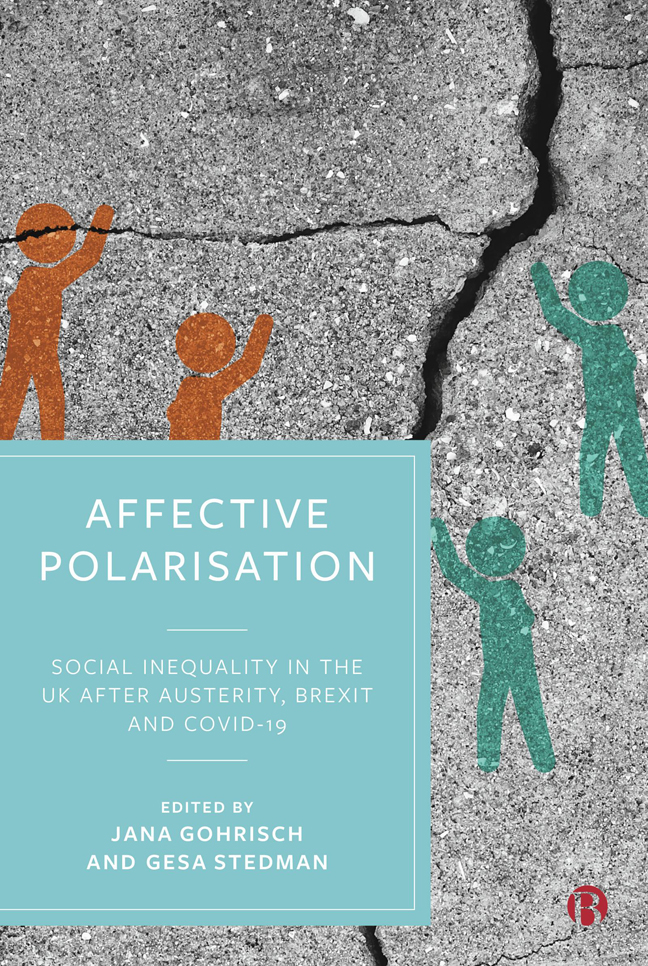Book contents
- Frontmatter
- Contents
- List of Figures, Tables and Boxes
- Notes on Contributors
- Acknowledgements
- Introduction
- 1 The Divided Left in the UK: Partisanship, Ideology and Class after Brexit
- 2 Populism and the People: Elitism, Authoritarianism and Libertarianism
- 3 ‘Coloring the Utterance with Some Kind of Perceivable Affect’: Constructing ‘Country’ and ‘People’ in Speeches by Theresa May and Boris Johnson – A Linguistic Perspective
- 4 The Challenges of Polarisation: Lessons for (Re-)Politicising Inequality across Four English Towns
- 5 “Go Away, But Don't Leave Us”: Affective Polarisation and the Precarisation of Romanian Essential Workers in the UK
- 6 Racialised Affective Polarisation in the UK
- 7 “Now You Have to Listen”: A Historical Analysis of Britain’s Left-Behind Communities
- 8 Britain in a State of Emergency: Studying Ken Loach's Films I, Daniel Blake (2016) and Sorry We Missed You (2019)
- 9 Cloaking Class: Making the Working Class Visible
- 10 Class, Poverty and Inequality in Scotland: Independence and the Creation of Affective Polarisations
- 11 Language and Identity: The Taliesin Tradition
- Conclusion
- Index
11 - Language and Identity: The Taliesin Tradition
Published online by Cambridge University Press: 23 January 2024
- Frontmatter
- Contents
- List of Figures, Tables and Boxes
- Notes on Contributors
- Acknowledgements
- Introduction
- 1 The Divided Left in the UK: Partisanship, Ideology and Class after Brexit
- 2 Populism and the People: Elitism, Authoritarianism and Libertarianism
- 3 ‘Coloring the Utterance with Some Kind of Perceivable Affect’: Constructing ‘Country’ and ‘People’ in Speeches by Theresa May and Boris Johnson – A Linguistic Perspective
- 4 The Challenges of Polarisation: Lessons for (Re-)Politicising Inequality across Four English Towns
- 5 “Go Away, But Don't Leave Us”: Affective Polarisation and the Precarisation of Romanian Essential Workers in the UK
- 6 Racialised Affective Polarisation in the UK
- 7 “Now You Have to Listen”: A Historical Analysis of Britain’s Left-Behind Communities
- 8 Britain in a State of Emergency: Studying Ken Loach's Films I, Daniel Blake (2016) and Sorry We Missed You (2019)
- 9 Cloaking Class: Making the Working Class Visible
- 10 Class, Poverty and Inequality in Scotland: Independence and the Creation of Affective Polarisations
- 11 Language and Identity: The Taliesin Tradition
- Conclusion
- Index
Summary
Introduction
This chapter offers a poet's perspective on how affective polarisation can be helpful in considering some of the conflicting interpretations of the modern history of Wales – and how they might be reconciled.
Bûm yn lliaws rith
cyn bûm ddisgyfrith
[I was in many forms, before I was unfettered].
(Evans, 1910, p 23)Let us begin, then, with a story: the story of Taliesin. The poet Taliesin was a historical figure, one of the earliest poets to write in Welsh, in the latter part of the 6th century. His 11 surviving poems constitute the earliest known British poetry in any language. However, it is the medieval myth surrounding his birth that describes how he accidentally acquired magic powers of shape-shifting and turned himself successively into a hare, a salmon, a bird and then a seed, in order to evade death at the hands of a murderous assailant. It is a story that has inspired creative minds as varied as Tennyson, Deep Purple and Frank Lloyd Wright, and in 1984 it suggested the title of Emyr Humphreys’ polemical history, The Taliesin Tradition, where he argued that Wales’ survival within the UK is a Taliesin-like constant reinvention in the face of successive threats to her identity.
But what is ‘identity’? Any attempt to describe it is at best a snapshot. It changes over time. We are not the same at the age of 60 as we were at six, despite the biological continuity. And then we must factor in the variables of perception. Different biographers will capture different aspects of one personal history or ‘identity’, much as different walks can lead you to the summit of the same mountain. Welsh identity also has its own ‘biographers’ differing wildly in their interpretations. The Wales of 2022 is not the same as the Wales of 1922, much less the Wales of 922, but there is also at least a degree of continuity – territorial perhaps, rather than biological.
Our focus here will be on national and regional identity, particularly its cultural aspects – a subject that has exercised Welsh poets ever since Taliesin. For much of Welsh history, the poets of Wales have taken on a responsibility as ‘people's remembrancers’, or as historian Gwyn A. Williams colourfully described them, ‘the rib-cage of the body politic … a collective memory honed for historic action’ (1986, p 19).
- Type
- Chapter
- Information
- Affective PolarisationSocial Inequality in the UK after Austerity, Brexit and COVID-19, pp. 212 - 232Publisher: Bristol University PressPrint publication year: 2023



